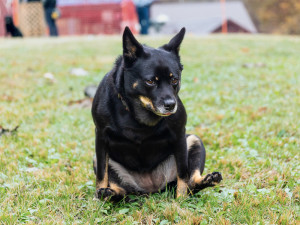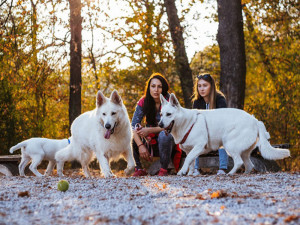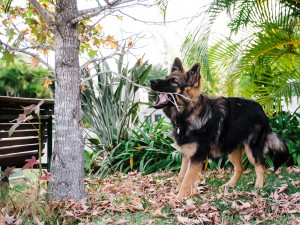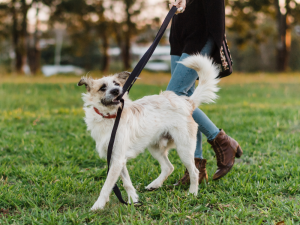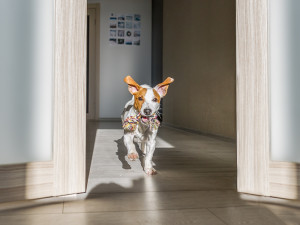Why Does Your Puppy Chase His Tail?
And when to talk to the vet.

Share Article
In This Article:
Normal Reasons for Puppy Tail-Chasing Medical Causes of Puppy Tail-Chasing Behavioral Causes of Puppy Tail-Chasing Frequently Asked Questions
Tail-chasing in puppies is often a normal, playful behavior stemming from curiosity about their own bodies and a desire for entertainment. However, while tail-chasing can be harmless, excessive tail-chasing may signal underlying issues, such as boredom, anxiety, or even medical conditions.
Normal reasons for a puppy chasing their tail
Playfulness
Puppies are extremely playful and everything is new to them; they explore everything. They are also beginning to learn about their environment and their bodies. Typically, a puppy who is just learning about their body will chase their tail because it’s fun.
Boredom or excess energy
When puppies are bored, they will get into anything and everything. Puppies are known to get into trouble when they have too much energy and no outlet to get it out. If your puppy is chasing their tail, they may be trying to entertain themselves while trying to shake out their sillies. It may be time to break out a toy or take your puppy on a walk where they get to sniff around.

Attention-seeking behavior
Puppies can learn from positive reactions and how you respond to a behavior. When you ask your puppy to sit, then you pet them and say, “Good dog.” Over time, they learn that “sit” was reinforced and will continue to do that. The same goes for chasing their tail. If your puppy chases their tail and you laugh and get excited, they may continue to do that behavior because it was reinforced. If you continue to respond in a way that excites your puppy when they chase their tail, they may be reinforced to continue doing that behavior.
Medical reasons for a puppy chasing their tail
Unfortunately, certain medical causes can be a reason your puppy is chasing their tail. If you notice that your puppy is chasing or biting at their tail more often or that it no longer looks like a fun game, there may be a medical cause and treatment may be warranted. This can include the following:
Fleas on your dog’s tail
If your dog has fleas, you may notice certain behavior changes. Fleas bite your dog’s skin, causing irritation which causes itchiness. As your puppy tries to scratch the itch, you may notice them chasing their tail or biting at their tail or skin. You must treat your dog right away if you notice signs of fleas. Fleas can be transferred to humans or furniture (though the latter is not an adequate host).
Impacted anal glands
A fishy odor is the typical red flag for anal gland issues. Anal glands are what gets released in your dog’s rectum they have a normal bowel movement. If you notice your dog scooting or biting or chasing their tail area, they may have impacted anal glands. Some do have a chronic issue with this, while for others, it may happen on occasion, such as after a bought of diarrhea, when the anal glands were not properly expressed.
Neurological issues
Certain neurological issues can be the cause of your dog’s tail-chasing. If you feel that the tail-chasing behavior has become severe, your dog may have an underlying cause as to why they are doing this behavior. Severe tail-chasing has been seen as a result of epilepsy in dogs.
Behavioral reasons for a puppy chasing their tail
Anxiety or stress
Puppies can suffer from anxiety and stress, similar to humans. Anxiety or stress in puppies can be caused by a variety of reasons and can have varying degrees of severity. As a coping mechanism, your dog may chase their tail to find relief from the stressful or anxious situation. If you believe your puppy is suffering from anxiety or stress, it’s important to seek the assistance of a trainer or veterinarian to help ease these issues.
Compulsive behaviors
Compulsive behaviors are normal behaviors that happen in extreme repetition. They may seem borderline frantic, considering the number of times they happen. Dogs can develop behaviors that indicate obsessive compulsive disorder, (OCD) and these behaviors may impact their ability to function. They may be unable to stop themselves from doing these compulsive actions. To address this issue, you may need to make behavior or environmental changes to help your dog from suffering from compulsive behaviors.
Lack of stimulation
If your puppy is suffering from a severe lack of stimulation, you may notice them doing certain repetitive behaviors, one of which may be tail-chasing. If the lack of stimulation is severe enough, it can lead to depression in dogs. When bringing a new puppy into your home, it is always important to research your breed to make sure that you will be able to fulfill their needs.
While tail-chasing can be fun and games, it’s important to be able to tell the difference between a fun or a serious issue. Always consult a veterinarian if you have any concerns about your pup.
FAQs (People also ask):
How can I tell if my puppy’s tail-chasing is play or a problem?
It comes down to how often your puppy is chasing their tail and if you can distract them from it.
If your puppy is chasing their tail frequently, and you cannot distract them with a toy, treat, or something else they enjoy, then this may be a compulsive behavior, and it would be best to seek the help of a veterinarian.
Why is my puppy scooting on their tail?
If you notice your puppy scooting, this usually means they are having difficulty releasing their anal glands, and they are trying to find a way to excrete them. If this is a frequent occurrence, your vet can train you how to release your dog’s anal glands at home. But it’s important to seek their assistance first for training or if you notice that the anal glands are infected or impacted.
References:
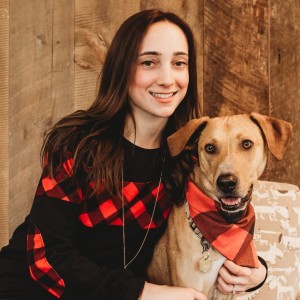
Danielle Vrabel, CPDT-KA
Danielle Vrabel is a dog trainer who earned her CPDT-KA in 2020. Danielle is a proud pet mom of five pets: two dogs, two cats, and a corn snake. Danielle has fostered over ten dogs and fifteen cats and kittens, as well as helped train shelter dogs before they are adopted. Both of Danielle’s dogs are pet therapy dogs, where she also volunteers her time helping evaluate future therapy dogs.
Related articles
![person playing tug with dog]()
The Do’s and Don’ts of Playing with Your Dog
Chase? Wrestle? Tug-o-war? Find out which are fair game.
![German Shepherd puppy pulling at a branch]()
Dog Life Stages: Puppy Adolescence Is Only a Phase
What to expect when your perfect puppy hits that unruly stage.
Are You to Blame for Your Dog’s Behavioral Issues?
You may have wondered if you're the one causing the problem.
![weird dog rolling in poop]()
7 Weird Dog Behaviors Explained
Chasing their tails, eating grass, and rolling in garbage — should you worry?
![Scruffy dog tugging on leash as owner is pulling it]()
How to Change the Way You Think About Your Dog’s Behavior
Instead of focusing on the negatives, here’s what you should do instead.
![Jack Russell Terrier Puppy zooming around with a toy at home.]()
6 Things to Know About Dog Zoomies
Not counting how fun they are to watch.
![Adorable dog sitting on a rug next to some boots scooting]()
Scooting After Pooping: Weird Things Dogs Do, Explained
Dog trainer Emma Bowdrey helps explain this common canine behavior.


